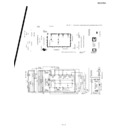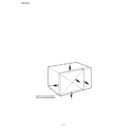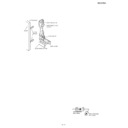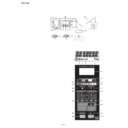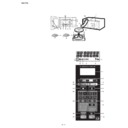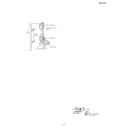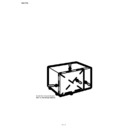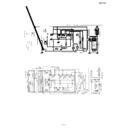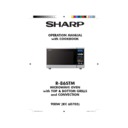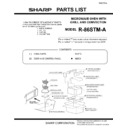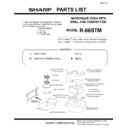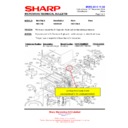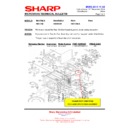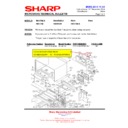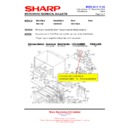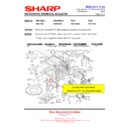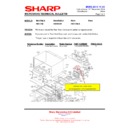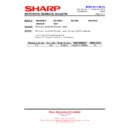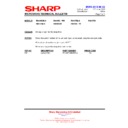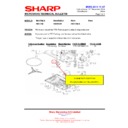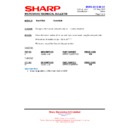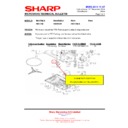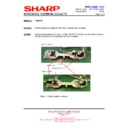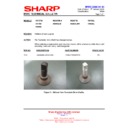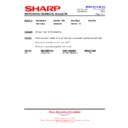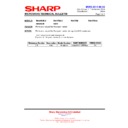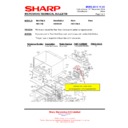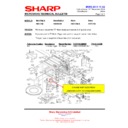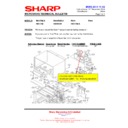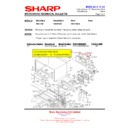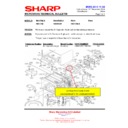Sharp R-86STM (serv.man11) Service Manual ▷ View online
R86STM
11 – 6
1. CARRY OUT 3D CHECKS.
2. Loosen the two (2) screws holding the latch hook to the oven cavity
front flange.
3. 3. With the door closed, adjust the latch hook by moving it back and
forward or up and down. In and out play of the door allowed by the
latch hook should be less than 0.5mm. The horizontal position of
the latch hook should be placed where the monitor switch has acti-
vated with the door closed. The vertical position of the latch hook
should be placed where the monitored latch switch and stop switch
have activated with the door closed.
latch hook should be less than 0.5mm. The horizontal position of
the latch hook should be placed where the monitor switch has acti-
vated with the door closed. The vertical position of the latch hook
should be placed where the monitored latch switch and stop switch
have activated with the door closed.
4. Secure the screws with washers firmly.
5. Make sure of the all switches operation. If the latch head has not
pushed the plungers of the monitor switch with door closed, adjust
the latch hook position. At that time, the latch head should have
pushed the plungers of the monitored latch switch and stop switch.
If the latch head has not pushed the plungers of the monitored latch
switch and stop switch with door closed, loose two (2) screws hold-
ing latch hook to oven cavity front flange and adjust the latch hook
position.
the latch hook position. At that time, the latch head should have
pushed the plungers of the monitored latch switch and stop switch.
If the latch head has not pushed the plungers of the monitored latch
switch and stop switch with door closed, loose two (2) screws hold-
ing latch hook to oven cavity front flange and adjust the latch hook
position.
2. After adjustment, make sure of following.
1. In and out play of door remains less than 0.5mm when latched
position. First check the latch hook position, pushing and pulling
upper portion of the door toward the oven face. Then check the
lower latch hook position, pushing and pulling lower portion of the
door toward the oven face. Both results (play of the door) should be
less than 0.5mm.
upper portion of the door toward the oven face. Then check the
lower latch hook position, pushing and pulling lower portion of the
door toward the oven face. Both results (play of the door) should be
less than 0.5mm.
2. The stop switch interrupts the circuit before the door can be
opened.
3. When the door is opened, the contacts (COM-NC) of the monitor
switch and monitored latch switch close. And the contacts (COM-
NO) of their switches open.
NO) of their switches open.
4. When the door is closed the contacts (COM-NC) of the monitor
switch and monitored latch switch open. And the contacts (COM-
NO) of their switches close.
NO) of their switches close.
5. Reinstall outer case and check for microwave leakage around the
door with an approved microwave survey meter. (Refer to Micro-
wave Measurement Procedure.)
wave Measurement Procedure.)
Figure C-6 Latch Switches Adjustment
[18] DOOR REPLACEMENT
1. REMOVAL
DOOR FRAME ASSEMBLY
DOOR FRAME ASSEMBLY
1. Disconnect the oven from the power supply.
2. Push the open button and open the door slightly.
3. Insert a putty knife (thickness of about 0.5mm) into the gap
between the choke cover and door frame as shown in Figure C-8 to
free engaging parts.
free engaging parts.
4. Release choke cover from door panel.
5. Now choke cover is free.
NOTE: When carrying out any repair to the door, do not bend or warp
the slit choke (tabs on the door panel assembly) to prevent
microwave leakage.
microwave leakage.
Figure C-8. Door Disassembly
6. Lift the door upwards.
7. Now, door frame assembly is free from oven cavity.
DOOR PANEL
8. Remove the six (6) screws holding the door panel to the door
frame.
9. Now, door panel is free.
LATCH HEAD AND SPRING
10.Slide latch head upward and remove it from door frame with releas-
ing latch spring from door frame and latch head.
11.Now, latch head and latch spring are free.
FRONT DOOR GLASS
12.Remove the two (2) door glass stopper from the door frame.
13.Remove the front door glass from the door frame by sliding right-
wards.
14.Now, the front door glass is free.
2. REINSTALLATION
1. Insert the front door glass to the door frame.
2. Fit the two (2) door glass stopper to the door frame to hold the front
door glass.
3. Reinstall the latch spring to the latch head. Re-install the latch
spring to the door frame. Re-install latch head to door frame.
4. Reinstall door panel to door frame.
5. Hold the door panel to the door frame with six (6) screws.
6. Located door panel hinge pins into cavity hinge location hole.
7. Reinstall choke cover to door panel by clipping into position.
NOTE: After any service to the door;
1) Make sure that the monitor switch, monitored latch
switch and stop switch are operating properly (Refer to
chapter “Test Procedures”.).
chapter “Test Procedures”.).
2) An approved microwave survey meter should be used
to assure compliance with proper microwave radiation
emission limitation standards (Refer to Microwave
Measurement Procedure.).
emission limitation standards (Refer to Microwave
Measurement Procedure.).
LATCH
HEADS
HEADS
LATCH HOOK
DOOR OPEN BUTTON
OPEN LEVER
DOOR
MONITOR SWITCH
MONITORED LATCH
SWITCH
SWITCH
STOP SWITCH
Choke Cover
Putty Knife
Door Frame
R86STM
11 – 7
3. After any service, make sure of the following:
1. Door latch heads smoothly catch latch hook through latch holes
and that latch head goes through centre of latch hole.
2. Deviation of door alignment from horizontal line of cavity face plate
is to be less than 1.0mm.
3. Door is positioned with its face pressed toward cavity face plate.
4. Check for microwave leakage around door with an approved micro-
wave survey meter (Refer to Microwave Measurement Procedure.).
NOTE: The door on a microwave oven is designed to act as an elec-
tronic seal preventing the leakage of microwave energy from
oven cavity during cook cycle. This function does not require
that door be air-tight, moisture (condensation)-tight or light-
tight. Therefore, occasional appearance of moisture, light or
sensing of gentle warm air movement around oven door is not
abnormal and do not of themselves, indicate a leakage of
microwave energy from oven cavity.
oven cavity during cook cycle. This function does not require
that door be air-tight, moisture (condensation)-tight or light-
tight. Therefore, occasional appearance of moisture, light or
sensing of gentle warm air movement around oven door is not
abnormal and do not of themselves, indicate a leakage of
microwave energy from oven cavity.
Figure C-9. Door Replacement
Pin
PIN
Lower
Oven Hinge
Oven Hinge
Upper
Oven Hinge
Oven Hinge
Lower
Oven
Hinge
Oven
Hinge
Choke Cover
Slit Choke
Door Panel
Door Frame
Assembly
Assembly
R86STM
11 – 7
3. After any service, make sure of the following:
1. Door latch heads smoothly catch latch hook through latch holes
and that latch head goes through centre of latch hole.
2. Deviation of door alignment from horizontal line of cavity face plate
is to be less than 1.0mm.
3. Door is positioned with its face pressed toward cavity face plate.
4. Check for microwave leakage around door with an approved micro-
wave survey meter (Refer to Microwave Measurement Procedure.).
NOTE: The door on a microwave oven is designed to act as an elec-
tronic seal preventing the leakage of microwave energy from
oven cavity during cook cycle. This function does not require
that door be air-tight, moisture (condensation)-tight or light-
tight. Therefore, occasional appearance of moisture, light or
sensing of gentle warm air movement around oven door is not
abnormal and do not of themselves, indicate a leakage of
microwave energy from oven cavity.
oven cavity during cook cycle. This function does not require
that door be air-tight, moisture (condensation)-tight or light-
tight. Therefore, occasional appearance of moisture, light or
sensing of gentle warm air movement around oven door is not
abnormal and do not of themselves, indicate a leakage of
microwave energy from oven cavity.
Figure C-9. Door Replacement
Pin
PIN
Lower
Oven Hinge
Oven Hinge
Upper
Oven Hinge
Oven Hinge
Lower
Oven
Hinge
Oven
Hinge
Choke Cover
Slit Choke
Door Panel
Door Frame
Assembly
Assembly
R86STM
11 – 7
3. After any service, make sure of the following:
1. Door latch heads smoothly catch latch hook through latch holes
and that latch head goes through centre of latch hole.
2. Deviation of door alignment from horizontal line of cavity face plate
is to be less than 1.0mm.
3. Door is positioned with its face pressed toward cavity face plate.
4. Check for microwave leakage around door with an approved micro-
wave survey meter (Refer to Microwave Measurement Procedure.).
NOTE: The door on a microwave oven is designed to act as an elec-
tronic seal preventing the leakage of microwave energy from
oven cavity during cook cycle. This function does not require
that door be air-tight, moisture (condensation)-tight or light-
tight. Therefore, occasional appearance of moisture, light or
sensing of gentle warm air movement around oven door is not
abnormal and do not of themselves, indicate a leakage of
microwave energy from oven cavity.
oven cavity during cook cycle. This function does not require
that door be air-tight, moisture (condensation)-tight or light-
tight. Therefore, occasional appearance of moisture, light or
sensing of gentle warm air movement around oven door is not
abnormal and do not of themselves, indicate a leakage of
microwave energy from oven cavity.
Figure C-9. Door Replacement
Pin
PIN
Lower
Oven Hinge
Oven Hinge
Upper
Oven Hinge
Oven Hinge
Lower
Oven
Hinge
Oven
Hinge
Choke Cover
Slit Choke
Door Panel
Door Frame
Assembly
Assembly
Display



